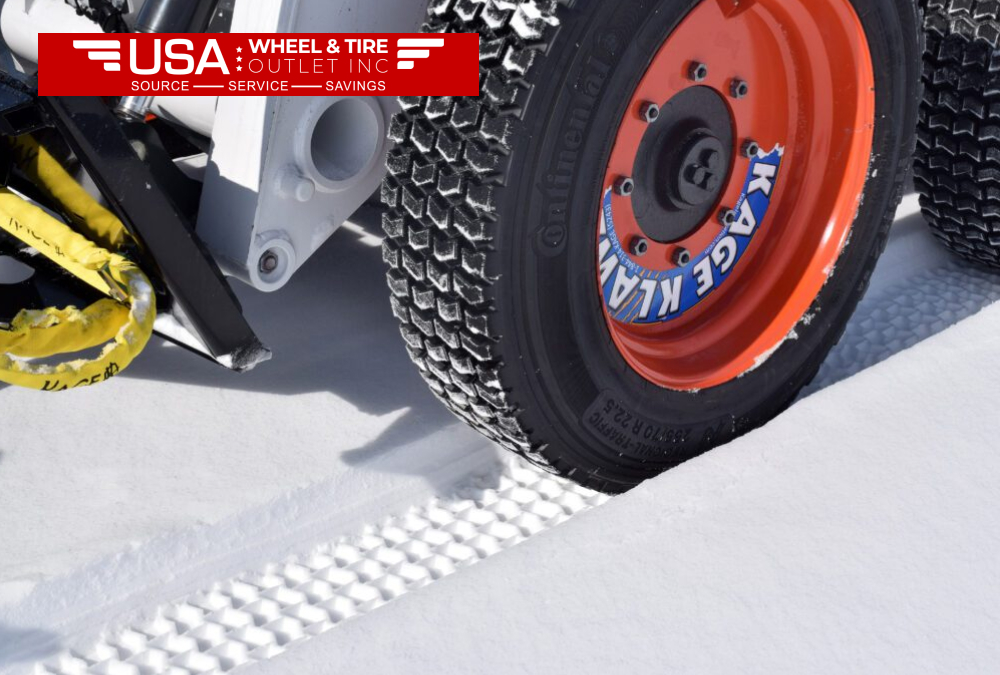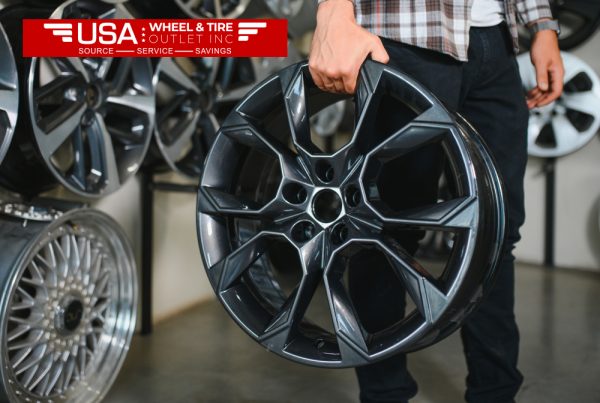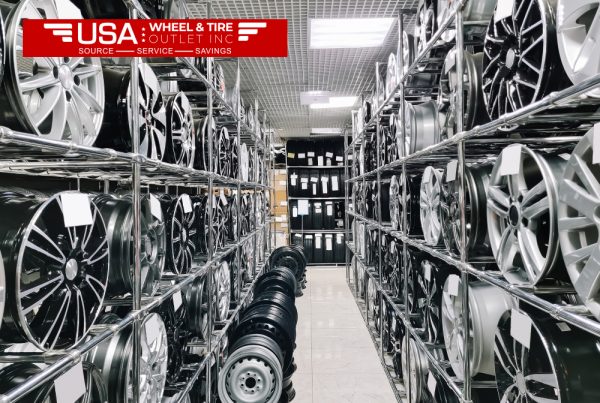You never know when winter will be at your doorstep, and for sure, the right snow tires on your skid loader make a big difference. Icy or snowy conditions require your skid loader to work well in terms of tire traction and stability to ensure the reliability and safety of operation. This guide covers all the information you need on choosing skid loader snow tires, from key features to maintenance tips, so you’re ready for cold-weather work.
Why Skid Loader Snow Tires Are Important during Winter
Skid loaders are some of the equipment found on many job sites, especially in winter when they are used in snow removal, clearing of icy terrain, and moving winter equipment. However, using regular tires makes this difficult and increases the likelihood of slipping. Snow tires are made with specific treads and materials to enhance the tire traction on icy surfaces, making it possible for skid loaders to easily move through winter conditions.
Key Features to Consider When Buying Skid Loader Snow Tires
To have the best experience with your skid loader during the winter, consider the following features when choosing snow tires:
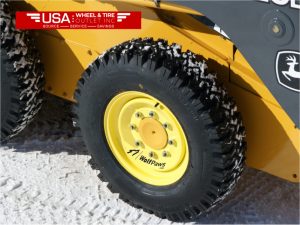
1. Tread design for maximum traction
Special designs for treads of tires that are on snow take hold of snow and ice. Look for deeper treads which are aggressive. One will easily shed slush and snow. There would be more grooves with increased numbers of sipes; all this will increase edges making tire grip better for hard-ice conditions while easy maneuvers and control.
2. Durable Rubber Compound
Cold weather requires a rubber compound which will keep tires from becoming too stiff. The winter-specific rubber remains soft in lower temperatures and helps the tire to hold onto the grip without cracking. This ensures that they can withstand the high usage when clearing snow or performing any other task under winter.
3. Self-Cleaning Capability
Skid loaders need snow tires that are self-cleaning. Tread designs that self-clean prevent the entry of snow and slush into the grooves of the tire. This otherwise causes a loss of traction. This will be helpful in maintaining traction and preventing downtime from cleaning.
4. Reinforced Sidewalls
Winter weather conditions add much stress on skid loader operations that carry heavy loads. A reinforced sidewall can offer support to loads and simultaneously reduce tire deterioration. In the case of snow skid loader tires, added support prevents piercing punctures and stability to skid loaders on even more jagged winter environments.
Role of Tire Service in Skid Loader Snow Tires
Proper skid loader snow tire maintenance is essential because most such tires wear and tear fast. When you would want to use these skid loader snow tires in heavy operation, especially when cold, such conditions increase the demands on the equipment and thereby wear out its tires easily. Here are some essential tips for maintaining tires.
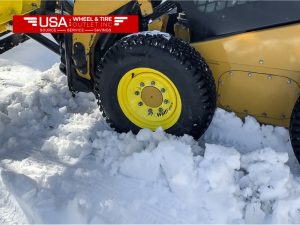
1. Check Tire Pressure Periodically
Cold temperatures make pressure reduce, which causes low performance and safety risk. Monitor tire pressure periodically to be within the right limits that give stability and best grip for effective movement.
2. Check Tread Wear
Check the tread of your skid loader snow tires regularly. When a tread is worn out, there is a possibility to lose grip on ice while making you slip more. However, if you feel major wear, then you know that it is time for the tires to be changed in order to continue operating at best efficiency.
3. Clean Your Tires
Even though snow tires have the self-cleaning ability, there may still be a need to remove extra dirt. Maintenance of regular cleaning will not allow dirt to accumulate on the tire, which would reduce the traction, and also one can notice potential damage on the surface of the tire.
4. Rotation of Tires
Tire rotation is also the best way to prevent uneven wear, especially in winter where skid loaders face much tougher terrain. Rotating the tires every few weeks also helps extend their life, ensuring consistent performance throughout the season.
Tips for Choosing the Best Skid Loader Snow Tires
Selecting the right snow tires for your skid loader depends on your work environment, typical tasks, and climate. Here’s a closer look at making the best choice for your needs:
1. Evaluate Your Everyday Working Conditions
Determine how rough your snow working condition is. For heavy snow grounds or icy sites, you have to work with aggressive tires and rubber, and for little snow works, a run-of-the-mill one with an average tread condition would suffice.
2. All-Terrain vs. Snow Dedicated Tires
In According to USA Wheel & Tire, While all-terrain tires can be used in winter, snow-specific tires have various advantages. Snow tires are produced using a special rubber compound for better performance in freezing temperatures while all-terrain tires become too rigid when extremely cold.
3. Tires with Heavy Load Capacity Rating
This is the tire load rating for your skid loader. It is pretty essential especially when you will use the loader to haul heavy materials. So, check out the load capacity of your snow tires. They should be able to handle your work demands without risking damage or decreased performance.
4. Accurately Match Tire Size
The right skid loader tire size is essential for safety and performance. A correct size will ensure the tires fit properly and make full contact with the ground. Refer to your skid loader’s manual for recommendations on the right size.
Advantages of Skid Loader Snow Tires
Switching to snow tires for your skid loader will help you in many ways and can improve efficiency and safety:
More Safety: The chances of accidents are less, and the movement is more under control due to greater traction on slippery surfaces.
Increased Productivity: Traction allows increased speeds and efficiency in the process of clearing snow in much less time.
Maintenance Cost: Snow tires help reduce the number of visits for repairs and increase their usage life.
Skid loaders with snow tires can maneuver in the tightest of places. It increases their versatility in many different winter tasks.
Conclusion
The right skid loader snow tires are what make winter work safe and effective. Aggressive treads, cold-weather rubber compounds, and reinforced sidewalls make these tires ready for tough conditions. Tires that match your workload, regular maintenance, and the right tread pattern can ensure your skid loader is performing optimally all winter long. Change to snow tires for this season – better grip, control, and safety on the job.
Read Also: Mastering Tire Siping: Improve Tire Adhesion
Skid Loader Snow Tires FAQs
Q1: Do I need special snow tires for my skid loader in winter?
Yes, as these snow tires are manufactured specifically for icy conditions and come equipped with unique treads and rubber compounds.
Q2: How often should I check the pressure of my skid loader snow tires?
You should check your tire pressure at least once a week during the winter. Pressure does indeed drop with cold temperatures, and this can affect traction and stability greatly.
Q3: Do I just need to use all-terrain tires, or do I need snow-specific tires?
All-terrain tires will work fine; however, they are better suited for those situations where performance is not so reliant on frozen conditions. Snow-specific tires have much more traction, flexibility, and grip within the winter season.
Q4. Which is the best tread pattern for skid loader snow tires?
Deep, aggressive with self-cleaning action helps to maximize traction on snow and ice.
Q5. What is typical life for skid loader snow tires?
Life depends on conditions and maintenance. Good-conditioned snow tires can last as long as several seasons.

